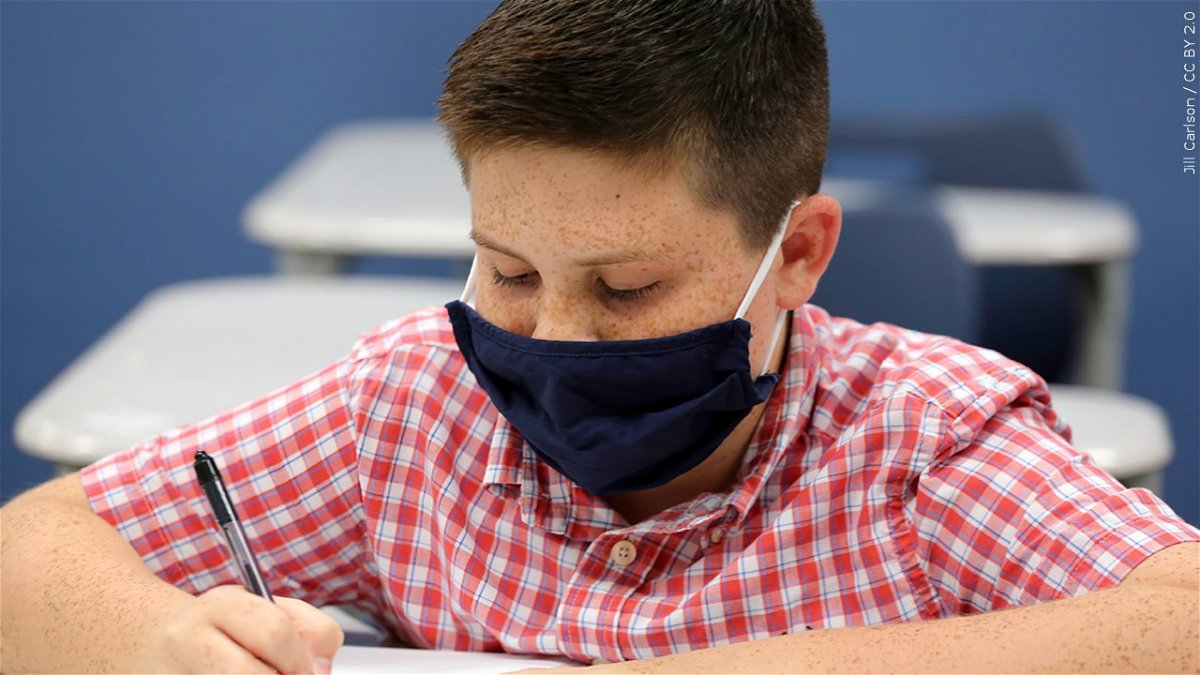Masks in school help prevent COVID-19 outbreaks and spread, CDC studies find

By Deidre McPhillips, CNN
COVID-19 outbreaks are far more likely in schools that don’t require students and staff to wear masks, new data from the US Centers for Disease Control and Prevention shows.
Two studies released Friday support the agency’s recommendation for universal indoor masking in schools.
One study in Arizona showed schools with no masking requirement were about 3.5 times more likely to have a COVID-19 outbreak than schools that had a universal masking requirement.
A second study showed counties across the US where schools required mask use also had less transmission of the virus in the community in general.
For the first study, researcher looked at data covering about 1,000 K-12 schools in Arizona’s Maricopa and Pima Counties, which are home to more than three-quarters of the state’s population.
A school was considered to have a masking requirement if all people — including students, staff, faculty and visitors — were required to wear a mask indoors, regardless of vaccination status. A school was considered to have an outbreak if there were two or more news cases among students or staff within a 14-day period, beginning a week after school started.
From mid-July through the end of August, 191 school-associated outbreaks occurred, according to the CDC. Schools with universal masking requirements in place at the start of school accounted for about 31% of the set of schools analyzed, but only about 8% of outbreaks. Meanwhile, schools with no masking requirement accounted for 59% of those outbreaks, but less than half (48%) of the total set of schools analyzed.
In early August, the CDC adjusted recommendations for masking in schools to include everyone, regardless of vaccination status, due to the prevalence of the more contagious Delta variant.
“I would say that data actually absolutely show that masking decreases outbreaks in schools,” CDC Director Dr. Rochelle Walensky said Monday. “So with the purpose of keeping our kids in school, getting them in school, having them be safe, masks really are the way to go.”
Another CDC study published Friday suggests that the effects of masking policies in schools appear to extend beyond classroom walls, too.
The study found that case rates among children increased more in counties where schools did not have mask requirements than they did in counties where schools mandated universal masking.
Between the week before school started and the week after school started, pediatric case rates increased more than twice as much in counties with no school mask requirements as they did in counties with school mask requirements.
Counties without school mask requirements added an average of about 35 new pediatric cases per 100,000 children each day over that two-week span, compared to a growth of about 16 new pediatric cases per 100,000 children each day in counties with school mask requirements.
For this study, the CDC analyzed pediatric case rates in about 500 counties in which mask requirements were consistent for all schools in the county and were applicable to either all students or no students. Findings were adjusted to control for pediatric vaccination rates at the county level, but not for vaccination rates among teachers or school testing data. Vaccination data is not available at the school level.
The CDC emphasizes the importance of “layered prevention strategies” — including vaccination, testing, enhanced ventilation and physical distancing along with masking — to stop the spread of COVID-19 and create safe in-school environments with minimal disruptions.
A third study published Friday by the CDC found that 96% of K-12 schools in the country have been fully open for in-person learning. But more than 900,000 students and nearly 60,000 teachers were affected by closures related to COVID-19 outbreaks between August and mid-September. The closures affected schools in 44 states and most were in the South.
In recent weeks, children 5 and up have had higher COVID-19 case rates than any other age group, according to data from the CDC. Children ages 12 to 17 also have the lowest vaccination rates of any age group. Children under 12 are not yet eligible to be vaccinated against COVID-19.
Dr. Scott Gottlieb, former commissioner of the US Food and Drug Administration and a board member of Pfizer, said that it’s not yet time for masks to be optional in schools.
“I think we’re going to have to get to a point where the vaccines are widely available in schools,” he told CNN Thursday. “Schools aren’t inherently safe environments, but they can be made more safe by taking proper precautions. Masks are certainly one tool.”
The-CNN-Wire
™ & © 2021 Cable News Network, Inc., a WarnerMedia Company. All rights reserved.



